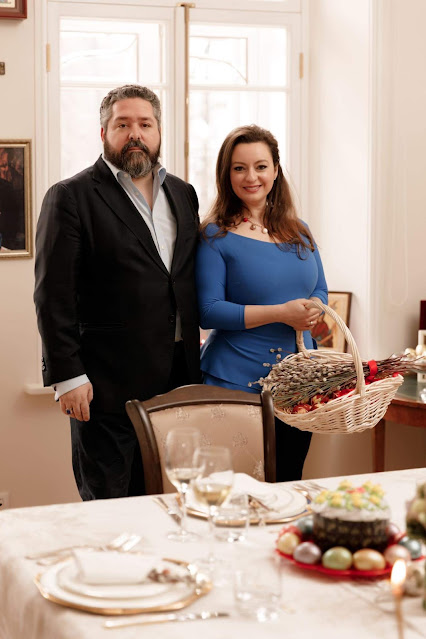King Simeon II of the Bulgarians attended Easter services at the St. Nedelya Metropolitan Cathedral in Sofia. With the blessing of His Holiness the Metropolitan of Sofia and Bulgarian Patriarch Neophyte, at midnight His Eminence Bishop Polycarp of Belogradchik proclaimed the Resurrection of Christ to the gathered crowd and celebrated the hierarch's Holy Liturgy in the church.
Nicholas of Romania, grandson of the late King Michael of Romania, and his wife Alina-Maria and their daughter Maria-Alexandra celebrated Easter at their home in Bucharest.Grand Duke George Mikhailovich of Russia and his fiancée Victoria Romanovna Bettarini celebrated Easter in Moscow. Victoria's father Ambassador Roberto Bettarini was able to spend the holiday with the couple. On the evening of 30 April 2021, Good Friday, Grand Duke George and Victoria Romanovna and Ambassador Bettarini attended services at the Vvedensky Temple near the Saltykov Bridge. Aided by her priest Father Nikon, Victoria Romanovna made traditional Orthodox Easter cakes using an original wooden mold that is over 150 years old. Grand Duke George and Victoria then hosted Easter dinner with Ambassador Bettarini and their priest Father Nikon at the couple's Moscow home.
Prince Philip and Princess Danica of Serbia marked Easter by attending Pascha services with their son Prince Stefan. Philip is the son of Crown Prince Alexander of Serbia.
As we conclude our exploration of the fascinating history of Orthodox royals in Bulgaria and Romania, we are reminded of the profound impact that these monarchs had on the spiritual and cultural landscape of Eastern Europe. Their unwavering commitment to the Orthodox faith not only shaped the course of their respective nations but also left a lasting legacy that continues to influence the region to this day. From the medieval era to the modern age, these monarchs have been instrumental in promoting the values of their faith, often through their patronage of monasteries and churches. This article has delved into the lives and legacies of these influential figures, shedding light on the pivotal role they played in shaping the course of Orthodox Christianity in the region.
As we reflect on the significance of these monarchs, we are struck by the enduring power of faith in shaping the course of human history. The Orthodox royals of Bulgaria and Romania serve as a testament to the profound impact that religious conviction can have on the world around us. Their stories remind us of the importance of preserving cultural heritage and the role that faith plays in shaping our identities. As we move forward, it is crucial that we continue to learn from the past, honoring the legacies of these remarkable individuals while also embracing the complexities and challenges of the present. By doing so, we can work towards a brighter future where faith and culture continue to thrive, enriching the lives of all those who call this region home.

















No comments:
Post a Comment